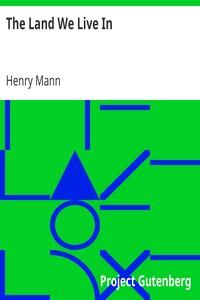|
|
Read this ebook for free! No credit card needed, absolutely nothing to pay.Words: 112760 in 41 pages
This is an ebook sharing website. You can read the uploaded ebooks for free here. No credit cards needed, nothing to pay. If you want to own a digital copy of the ebook, or want to read offline with your favorite ebook-reader, then you can choose to buy and download the ebook.

: Welsh Folk-Lore a Collection of the Folk-Tales and Legends of North Wales by Owen Elias - Tales Wales; Legends Wales@FreeBooksTue 06 Jun, 2023 told him that her affection for him was unabated, and warned him to be careful lest through inadvertence he might give the last and only blow which, by an unalterable destiny, over which she had no control, would separate them for ever. One day it happened that they went to a funeral together, where, in the midst of mourning and grief at the house of the deceased, she appeared in the gayest of spirits, and indulged in inconsiderate fits of laughter, which so shocked her husband that he touched her, saying--"Hush! hush! don't laugh." She said that she laughed because people when they die go out of trouble, and rising up, she went out of the house, saying, "The last blow has been struck, our marriage contract is broken, and at an end. Farewell!" Then she started off towards Esgair Llaethdy, where she called her cattle and other stock together, each by name, not forgetting, the "little black calf" which had been slaughtered and was suspended on the hook, and away went the calf and all the stock, with the Lady across Myddvai Mountain, and disappeared beneath the waters of the lake whence the Lady had come. The four oxen that were ploughing departed, drawing after them the plough, which made a furrow in the ground, and which remains as a testimony of the truth of this story. She is said to have appeared to her sons, and accosting Rhiwallon, her firstborn, to have informed him that he was to be a benefactor to mankind, through healing all manner of their diseases, and she furnished him with prescriptions and instructions for the preservation of health. Then, promising to meet him when her counsel was most needed, she vanished. On several other occasions she met her sons, and pointed out to them plants and herbs, and revealed to them their medicinal qualities or virtues. So ends the Myddvai Legend. Cras dy fara, Anhawdd ein dala, which, with a little circumlocution, means, 'For thee, who eatest baked bread, it is difficult to catch us.' One day some moist bread from the lake came to shore. The farmer devoured it with great avidity, and on the following day he was successful in his pursuit and caught the fair damsels. After a little conversation with them, he commanded courage sufficient to make proposals of marriage to one of them. She consented to accept them on the condition that he would distinguish her from her two sisters on the following day. This was a new, and a very great difficulty to the young farmer, for the fair nymphs were so similar in form and features, that he could scarcely perceive any difference between them. He observed, however, a trifling singularity in the strapping of her sandal, by which he recognized her the following day. Some, indeed, who relate this legend, say that this Lady of the Lake hinted in a private conversation with her swain that upon the day of trial she would place herself between her two sisters, and that she would turn her right foot a little to the right, and that by this means he distinguished her from her sisters. Whatever were the means, the end was secured; he selected her, and she immediately left the lake and accompanied him to his farm. Before she quitted, she summoned to attend her from the lake seven cows, two oxen, and one bull. This lady engaged to live with him until such time as he would strike her three times without cause. For some years they lived together in comfort, and she bore him three sons, who were the celebrated Meddygon Myddvai. As she now deemed the terms of her marriage broken, she immediately departed, and summoned with her her seven cows, her two oxen, and the bull. The oxen were at that very time ploughing in the field, but they immediately obeyed her call, and took the plough with them. The furrow from the field in which they were ploughing, to the margin of the lake, is to be seen in several parts of that country to the present day. The Meddygon Myddvai were Rhiwallon and his sons, Cadwgan, Gruffydd, and Einion. They were the chief physicians of their age, and they wrote about A.D. 1230. A copy of their works is in the Welsh School Library, in Gray's Inn Lane." Such are the Welsh Taboo tales. I will now make a few remarks upon them. "Meddyg, nis gwnai modd y gwnaeth Myddfai, o chai ddyn meddfaeth." Free books android app tbrJar TBR JAR Read Free books online gutenberg More posts by @FreeBooks
: Journeys to Bagdad by Brooks Charles S Charles Stephen Lewis Allen Illustrator - Essays@FreeBooksTue 06 Jun, 2023

: Opere Volume Secondo : scritti critici e letterari by Berchet Giovanni Bellorini Egidio Editor - Italian literature History and criticism IT Letteratura@FreeBooksTue 06 Jun, 2023
|
Terms of Use Stock Market News! © gutenberg.org.in2025 All Rights reserved.






